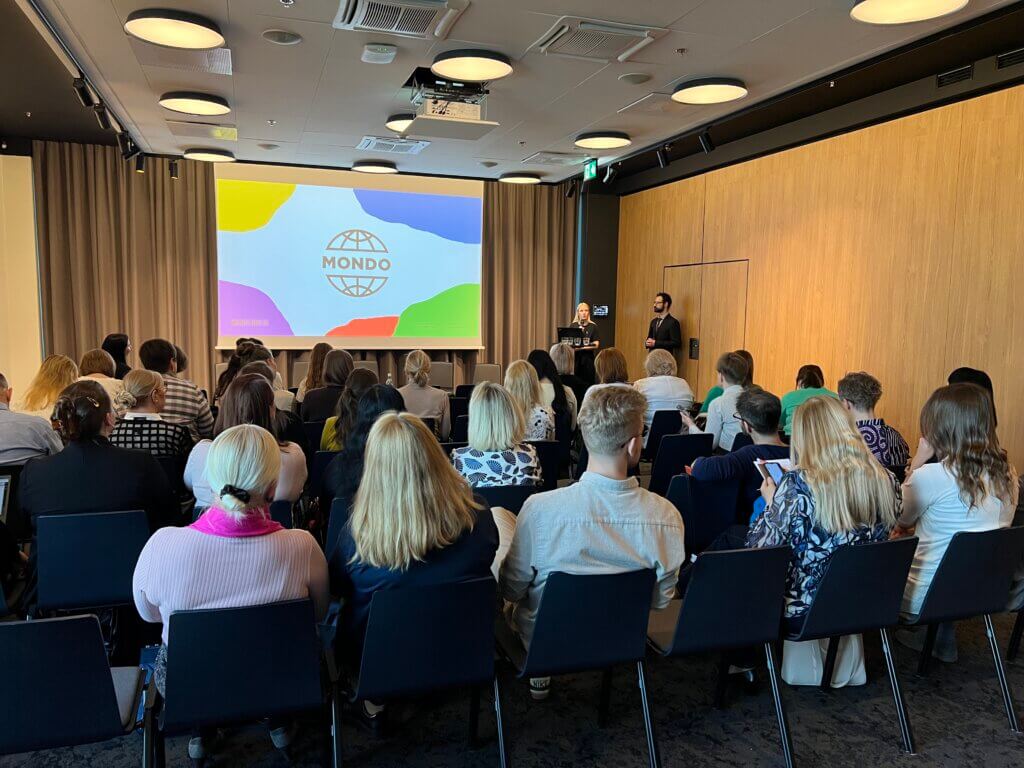02.06.25
Estonian experiences support the development of VET education in Ukraine
Kristi Lillemägi
Mondo’s Ukraine Project Manager
The strength of vocational education in Ukraine is of utmost importance, as the war has significantly changed the labor market, making it essential to teach new and modern professions quickly and with high quality. Estonia’s experience in this field serves as a valuable guiding example.
In mid-May, representatives from the Estonian Ministry of Education and Research and the Ministry of Economic Affairs visited Ukraine to share experiences with their Ukrainian colleagues on labor market and education matters—particularly the opportunities and challenges of vocational education.
To better understand the differences between the two countries: Ukraine has a total of 653 vocational schools, of which 180 have been damaged in the course of the war and 12 destroyed. Many schools have also lost a large portion of their students to the frontlines. In comparison, Estonia has a total of 31 vocational schools, in addition to five applied higher education institutions that offer vocational education.
At the same time, the war has significantly altered the Ukrainian labor market. In a survey conducted at the beginning of the year, 32% of employers admitted that they lack employees with the necessary skills. The destruction caused by the war has also greatly increased the demand for people who can contribute to both physical and digital reconstruction—builders, electricians, software developers, and more. Vocational schools play a key role in helping society adapt to this new reality and in training the necessary workforce. It is particularly important to invest in teacher development, support them in acquiring basic digital skills, and equip them with modern digital tools and interactive teaching methods—skills that are essential for Ukraine’s reconstruction. Digital skills are increasingly essential in vocational schools, as modern professions require growing use of technology, and digital competence enhances competitiveness and adaptability in a changing work environment.
Discussions on Challenges and Lessons Learned
On May 13, as part of the visit, a joint discussion was held on “Challenges and Lessons of Vocational Education in Ukraine During Crisis.” Alongside Ukrainian officials, Estonian experts in education, labor market, and development cooperation participated, as well as all those interested in the role of vocational education in resolving social crises and shaping future skills.
For the representatives of the Ukrainian Ministry of Education and Science and the Ministry of Economy, one of Estonia’s strengths lies in its well-structured central coordination system, platforms for sharing digital learning materials, and the ongoing professional development structure for teachers—all of which could offer much-needed solutions for Ukraine. Estonia’s education system has focused on improving teachers’ digital skills through updated curricula and integrating vocational institutions into technological advancements. For instance, starting in 2026, vocational schools in Estonia will be included in the national AI development program. The experience gained from using AI in education could certainly be shared with Ukraine. Another key strength is that teacher trainings in Estonia are not one-time events, but regular and based on the actual needs of teachers.
Participants also highlighted the role of educational technologists in Estonia, who have supported teachers for over 15 years and made significant contributions to the digitization of learning materials and the development of the learning process. For Ukrainian experts, involving educational technologists and receiving centralized state support are potential development directions, with related discussions already underway in Ukraine. Ukraine is also interested in Estonia’s experience in applying artificial intelligence and virtual reality in education. Their current challenge is not only the lack of technical tools, but also the shortage of teachers who know how to use these new tools effectively. Estonia’s own experience has shown that in addition to making technology accessible, it is crucial to prepare people to use it. To support this, Mondo will, in the coming years, organize digital competence training for teachers and management of Ukrainian vocational education institutions. In cooperation with the University of Tartu, a curriculum for educational technology will also be developed.
Multiple Opportunities for Cooperation
Estonian experts also pointed out several other opportunities for cooperation between the two countries. For example, Estonia’s Estonian-language educational materials could be translated and adapted to the Ukrainian context. It is also important to foster two-way practical experience sharing through teacher exchanges, joint projects, and pilot programs.
By the end of the discussion, representatives from both countries concluded that the foundation of everything is lifelong learning, which supports the building of a high-quality and modern education system. Estonia can be a valuable partner for Ukraine in this, and Estonia, in turn, has much to learn from Ukraine about being better prepared for potential crises and making the most effective use of the education system in such times.
The visit took place in frame of Mondo’s project “Empowering VET Education: A Systematic Approach Through Digital Competence Training and Educational Technology Curriculum Development,” whithin the framework of the Multi-Donor Initiative Skills4Recovery, which is financed by the European Union, Germany, Poland, Estonia and implemented by Deutsche Gesellschaft für Internationale Zusammenarbeit (GIZ) and the Solidarity Fund PL (SFPL).
